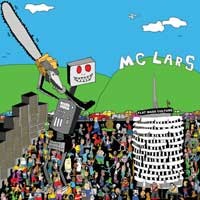
MC Lars
This Gigantic Robot Kills (2009)
William_David
The self-proclaimed post-punk laptop rapper returns with his first full-length since 2006's The Graduate in the nominally Wesley Willis-influenced This Gigantic Robot Kills (TGRK). And from the first track to the last, it is an all-around better effort, but not without a few slight problems.
The most obvious downside (other than the one long-time critics will shout -- "He's a nerdcore rapper!") is that of 14 tracks, six have previously appeared, whether on his split with YTCrackker, The Digital Gangster LP, his holiday EP, The Green Christmas, or various singles released via MySpace over the last three years. That's not to mention a seventh (pretty much) previously heard tune in MC Lars' cover of Atom and His Package's "(Lord It's Hard to Be Happy When You're Not Using) the Metric System," which misses the idea of putting an original spin on a cover, instead mostly recreating the track with a slightly different beat and delivery.
Consequently, fans who have continued to follow Lars may feel slightly ripped by the amount of new content, but everyone else will find TGRK to be a mostly fresh album. Moreover, it flows surprisingly well for such a mix and match of old and new tracks, which is the primary area where it surpasses The Graduate. While The Graduate was full of solid songwriting concepts and great beats, it sometimes sounded forced and a couple of tracks ("Six Degrees of Kurt Cobain" most notably) were arguably throwaway.
This Gigantic Robot Kills also feels like a more honest album for Lars, who has grown confident in his sound as nerdcore has risen. Just as importantly key to TGRK's success is the lineup of featured performers Lars brings to his newest effort is how well he utilizes them and how awesomely he emulates the sounds of the different genres to which he's paying tribute or lambasting.
The album opens with "Where Ya Been Lars?", a slow-burning intro track on which Lars drops lines about his career and names galore. It includes a dis (nerdcore beef alert!) of MC Chris for reportedly asking for $3,000 after recording "The Roomate from Hell" on The Graduate, and the great line -- "I DJ'ed Johnny Philips wedding / Gerard Way was there / I was like, âWe have the same booking agent' / He was like, âAsk me if I care.'"
It is followed by a more proper introduction in "True Player for Real," featuring a clip from Wesley Willis, and Lars' childhood idol "Weird Al" Yankovic on accordion. The title track will be the gem for ska-punk fans, however, featuring performances by Suburban Legends and, more importantly, MC Bat Commander of the Aquabats.
Back before Gwen Stefani started rapping with Pharrell / Gas cost $1.15, and Goldfinger could sell ⦠Billy was obsessed with third-wave ska / The Mighty Bosstones, Real Big Fish, Less Than Jake, he's seen them all / He longed for a time when even Bill Clinton played the sax on the White House lawn, and kids wore shades and checkered slacks"
Musically, the track is a brilliant melding of mid-`90s ska-punk, calling to mind many of the bands it name-drops. It's followed by "No Logo," a duet with Nova Scotian indie rapper Jesse Dangerously that examines anarchism, Howard Zinn and the like. It's followed perfectly with a mood-changer in "35 Laurel Drive," a throwback to early quirky Lars tracks with simple lyrics playfully bashing his drummer, Jon Thatcher Longley, for having "the messiest house in New Jersey."
Later, Lars tackles gaming in "Guitar Hero Hero (Beating Guitar Hero Does Not Make You Slash)," featuring Parry Gripp of Nerf Herder and Paul Gilbert of Mr. Big, and "O.G. Original Gamer," with fellow nerdcore artists MC Frontalot and Jonathan Coulton. "We Have Arrived" brings k.flay, YTCracker and the Former Fat Boys together for a proclamation of the success of nerds and nerdcore, and is likely one of the best rap tracks that will appear this year, playing off the abilities of the individual artists in a showcase of talent.
Again, MC Lars isn't always tackling the most controversial of topics in his lyrics -- with tracks about "Guitar Hero" not making people real musicians, white kids not being hyphy and hipster girls being, well, pretty lame. But as is always the case, it's mostly a fresh stream of good, creative fun for the nerds in all of us. Lars also surprises by taking an incredibly serious turn with "Twenty-Three," a somber track about a college roommate (who was featured on Lars' debut album, Radio Pet Fencing) who committed suicide. Aside from the sad tone, the track helps personalize the artist, bring more attention to depression and suicide, and balances the flow of the album.
This Gigantic Robot Kills continues the evolution of MC Lars and follows through on the promise of truly great rap and quality songwriting mixed with an original personality steeped in `90s culture that came with The Laptop EP in 2004. In his own words, "This is the victory anthem."